Gillard’s message to women on ‘being a hard-to-get-along-with b*tch’
A decade on from her infamous misogyny speech, Julia Gillard speaks out about why women are labelled ‘a b*tch’, why she won’t weigh in on current politics – and her biggest regret from her time as PM.
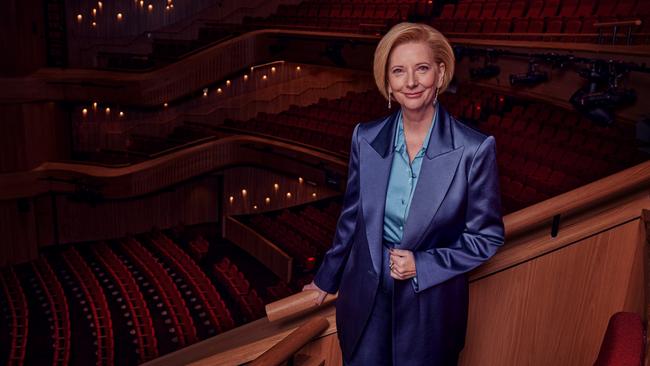
Stellar
Don't miss out on the headlines from Stellar. Followed categories will be added to My News.
The enduring axiom that “the personal is political” has been used as a rallying cry for women’s rights since it was coined in 1969, but it could just as easily have summed up Julia Gillard’s defining moment as the nation’s first female prime minister.
Against a backdrop of intense and, at times, violent scrutiny around what she wore, how she acted, and the life she led away from the halls of power, Gillard delivered her landmark “misogyny speech” on October 9, 2012, and her words soon reverberated around the world.
Ten years later, ahead of a speaking tour to mark its anniversary, Gillard insists the fight isn’t over.Eventually, she says wryly, she will rest. But first, the 27th Prime Minister of Australia tells Stellar: “There are still so many things to do to achieve gender equality.”
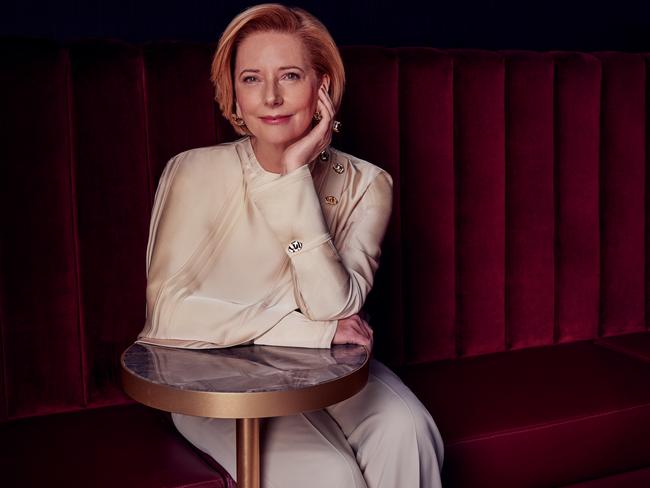
Stellar: Next month will mark a decade since the misogyny speech. No doubt a lot of people will be surprised to realise that was 10 years ago. How about you?
Julia Gillard: I always underestimate how long ago it was. An 18-year-old girl would come up to me and say, “Oh, I was in primary school when I heard your speech.”
And [I’m] like, “How can you be a walking, talking adult out in the world?” [Laughs] It does feel more recent.
S: Let’s go back to October 9, 2012. Were you aware at the time of the impact it might have? Giving the speech, I didn’t have any sense of the impact it would have?
JG: If you’d asked me 30 seconds after I sat down, “How is the press gallery going to report this? How is it going to reverberate?” I would have said, “I don’t see that this is going to reverberate in the world.”
So I didn’t have that sense about it. But even by the time I’d walked back to my office from the chamber – which is only a two- or three-minute walk – there were starting to be calls and a reaction beyond Canberra.
So I got an early inkling from that, that it was going to have some sort of emotional resonance beyond the confines of Parliament House.
I think its power has been that there are millions of women – and I feel like I’ve met millions of them – who have lived through sexist experiences, misogynistic experiences. And at 3am they’re going, “Oh, I wish I’d said that, I should have given it back to him, I shouldn’t have taken it.” And it’s a speech that helps capture the frustrations of those moments.
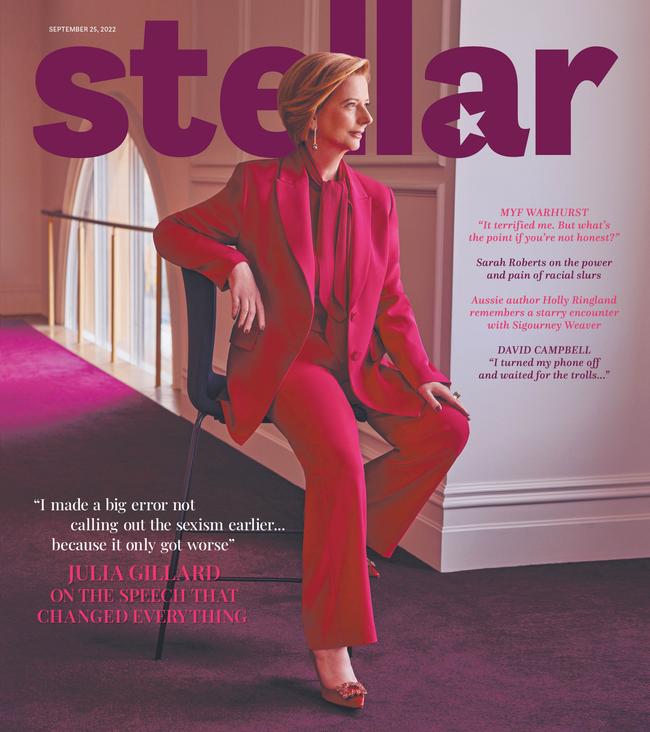
S: I have an unwritten thesis/book/TED Talk called Anger And The Nice Girl, which is about how anger can be liberating when deployed carefully by someone whose natural setting is to be decent and pleasant. How do you feel about the motivating force of anger, particularly for women?
JG: I think women feel anger, but we often choke it down because there is an expectation and a socialisation that we’re not the people who cause confrontations – and also that we intuitively know that on the other side of expressing your anger is an easy characterisation of “What a bitch”.
So the line between “Nice, decent woman I care about and want to work with and socialise with” and “God, she’s a hard-to-get-along-with bitch” is a very thin line. And it’s easy to fall [on] the other side of it, and I think we just self-limit a lot so we don’t fall [on] the other side of it.
So I think it was a coming together of [having] spent years honing my craft in that parliamentary theatre – and being hard-hitting in it – with this personal, righteous anger. And, so, the skill from having been in that theatre a long time and the righteous anger came together.
I think it’s harder in many ways to find the tone for that righteous anger in ordinary life, where you don’t have those sanctioned behaviours and people just look and go, “Wow, that’s a big disturbance in the office” or “That’s something I didn’t expect”. But I do think we, as women, can’t just keep self-limiting.
We do have to find a way of hitting that tone when it’s justified or behaviours go uncalled out or unaddressed or only addressed meekly or politely. And one thing I do think about the coming generation of feminists and activists is [that] they’re less worried about being characterised as impolite.
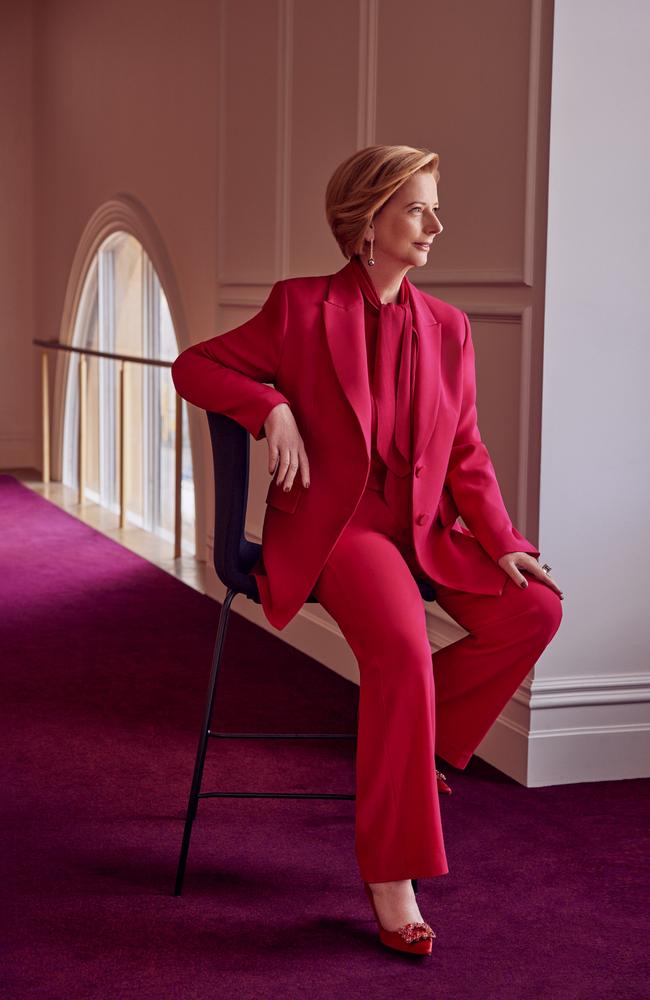
S: You will be taking to the stage at Not Now, Not Ever to coincide with the anniversary next month. How do you see the evening unfolding?
JG: I think people are coming to hear the story of the misogyny speech and the aftermath, so there will be a section of the evening that looks back. But I’m really keen to make sure that this is not a show of nostalgia.
I don’t want people wandering out misty-eyed, the way we might if we watch an old movie. I want people to walk out going, “OK, that happened then, and this is the world we still live in now.”
I want them to go out full of zing, full of fight, because there are still so many things to do to achieve gender equality.
S: What progress do you believe we have made since when you became Australia’s first female prime minister in 2010?
JG: The big thing that’s improved in my view is that people are now much more attuned to, interested in and prepared to talk about gender and sexism and misogyny. The sort of fashionable framing around me coming to the prime ministership was, well, “She’s not being treated any differently than any other prime minister.”
And now I think we see it, people name it, we have a dialogue about it. We’re having the right conversation …. The dialogue after [Hillary] Clinton lost in 2016 against Donald Trump, obviously the American presidency being so visible on the world stage, I think people started to see it. And the other sort of epoch-changing thing in the 10 years, I think, has been the #MeToo movement.
S: All of which means there is a generation of young women who have discovered your speech courtesy of TikTok, who would be oblivious to the fact that it was largely frowned on to talk about these things only 10 years ago.
JG: That’s true, which in some ways can make having the discussion with younger women harder. But, overwhelmingly, I think that’s a good thing because change comes when people start having experiences and they say, “This reality is still unfair. It needs to change.”
S: Speaking of TikTok, when looking at something such as the recent outpouring of misogyny towards Amber Heard in the wake of her losing a defamation suit brought by Johnny Depp, do you fear there has been a backlash this past year to the inroads made by the #MeToo movement?
JG: I think there’s been some forward movement and social media has been a fantastic tool in that. But there’s no doubt that social media has unleashed a sort of vile undercurrent of misogyny and sexism. And, in my own head, I still don’t know the answer to this.
I don’t know whether that was always there and the speed and the anonymity of social media has just given it a channel – or whether, actually, the speed and anonymity and the fact that it builds upon itself makes it worse.
Women politicians get it much more than male politicians. And it’s much more violent. It quickly goes from, “You’re an idiot who doesn’t know anything about how to govern” to death and rape threats.
S: When you look back on your time as PM, what are you most proud of?
JG: Obviously, I continue to be proud of the misogyny speech, but [also] the National Disability Insurance Scheme [NDIS] and the Royal Commission into child sexual abuse. You know, Australians coming up to me and saying, “It’s the first time I ever told what happened to me, and someone believed me instead of just slamming a door in my face.”
I think that’s made a very big difference.
S: And your greatest regrets? Is there anything you would do differently if you could?
JG: I still believe in the sort of policy we put around putting a price on carbon. If I could use the time machine and go back, I still believe in that policy, but there are lots of things about how we did that and how I personally campaigned for it that you’d want to do over.
And then, on the area of gender and sexism, I made a big error not calling it out earlier in my prime ministership … As the government got into more difficult times, the sexism got worse, leading ultimately to the misogyny speech.
But I do wonder if I’d started calling it out earlier whether it would have been more effective.
S: The ALP has been returned to power federally this year for the first time since you, and then briefly Kevin Rudd, were in power in 2013. You supported Anthony Albanese during the election campaign – how would you rate his first few months in office?
JG: I’m absolutely delighted. I sat at home staring at my TV screen on election night, anxiously watching the results come down. And I think they’ve made an incredible start. It’s terrific to see.
S: I also wanted to ask you for your view on Scott Morrison secretly taking on five ministerial roles during his time as PM, but you don’t wish to comment on day-to-day politics. Your refusal to weigh in to such matters is in stark contrast to some of your fellow former PMs and has won you not only the admiration of many Australians but even the begrudging respect of some of your fiercest critics from back in the day. Presumably it has been a concerted decision by you not to weigh in to current political commentary?
JG: Yeah, definitely a conscious decision but, really, I made it in 2013 when I left the parliament – that I wouldn’t be drawn into day-to-day political commentary.
The main driver was I knew I needed to build the rest of my life, and it would have been harder for me to do that personally if I kept getting dragged back in to that section of my life.
I was an employment lawyer for a period before I went into parliament and you’d get people who would come in those days with lever arch folders full of documents. And often something really bad had happened, but what was driving their pain at that point was continuing to obsess about it.
And I kind of had that in my mind: you can be the person who obsesses forever about the past or you can close the cover of that book and you can go and select another book.
I chose to do that for my own mental health [and] my enjoyment of this period of my life. And I think that’s worked for me personally. It was really about how I navigate the world.
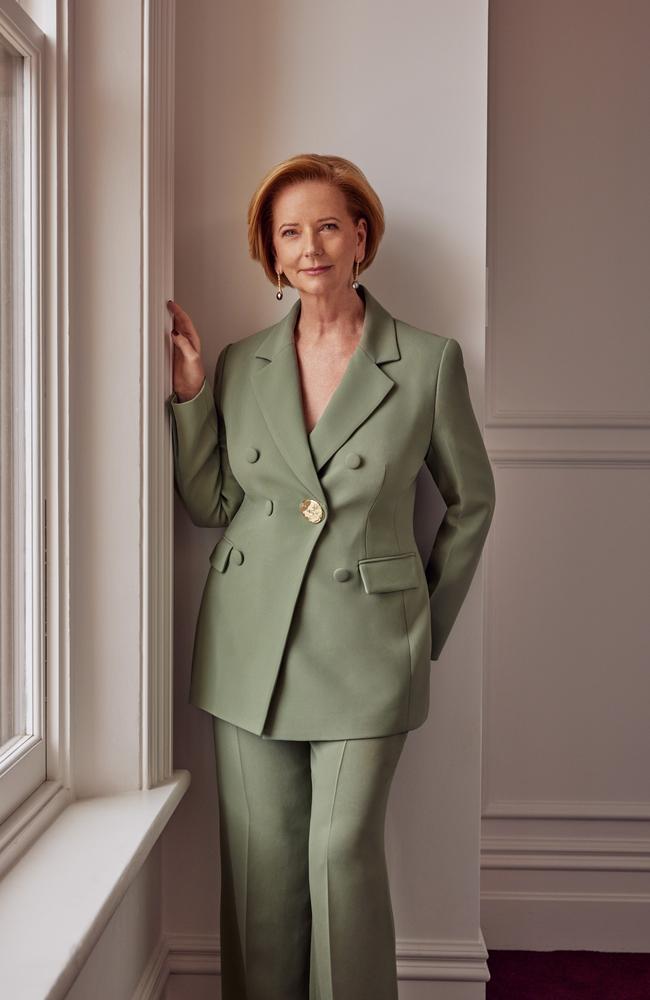
S: What does your day-to-day life look like in 2022?
JG: I divide my time between Australia and the UK, so I joke that I’ve got a hell of a commute. And, clearly, in the era of Covid, a lot of that [chairing the Welcome charitable foundation and the Global Institute For Women’s Leadership] wasn’t possible.
When I’m not in London, I’m here at home in Adelaide where my family is, or I tend more than any other place to be in Melbourne because it’s where [mental-health organisation] Beyond Blue has its headquarters.
So, I joke with people that I chair things, but it’s a mix of things that I’m absolutely passionate about, and causes I believe in.
S: We’ve now had five prime ministers in Australia since you left office, all of them men. When do you think we’ll see another female PM?
JG: Well, I’m hoping Albo and the team form a very long-term Labor government. So if they’re there for many, many years, that would be fine by me … People always want me to name women who could potentially be prime minister, but it’s mistaking the issue because it’s never about the one.
You know, politics – and life – is an unpredictable thing. If there’s only the one, you know, she could get herself in a political scandal. She could hit a bout of ill health. I mean, if it’s just the one, then it’s not going to work.
You’ve got to be able to look at a political party and say, “Oh, well, she could do it, or she could do it, or she could do it.” Or, “He could do it, or he could do it, or he could do it.”
And if you’re naming ones on both sides in equal numbers, then you maximise the chance [of a female PM].
S: What’s left for you to achieve? Any unfinished business?
JG: I’m content really with the mix of things that I’m doing now. I will be 61 at the end of September, but I can see myself continuing to work like this for quite a few years to come.
A friend of mine in Melbourne jokes that from time to time the phrase in her head about her own life is, “And then she rested.” [Laughs] Sooner or later, I think that will come to me. But I can’t see it from here.
Julia Gillard will take the stage at Not Now, Not Ever, in Melbourne on October 4 and Sydney on October 5, alongside a line-up of special guests. Visit premier.ticketek.com.au. Gillard’s book Not Now, Not Ever (Penguin Random House, $35) is out October 5.
Originally published as Gillard’s message to women on ‘being a hard-to-get-along-with b*tch’


